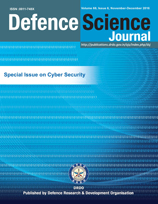Cryptanalytic Attacks on IDEA Block Cipher
DOI:
https://doi.org/10.14429/dsj.66.10798Keywords:
International data encryption algorithm, secret key, symmetric key block cipher, cryptanalysisAbstract
International data encryption algorithm (IDEA) is a secret key or symmetric key block cipher. The purpose of IDEA was to replace data encryption standard (DES) cipher, which became practically insecure due to its small key size of 56 bits and increase in computational power of systems. IDEA cipher mainly to provide data confidentiality in variety of applications such as commercial and financial application e.g. pretty good privacy (PGP) protocol. Till 2015, no successful linear or algebraic weaknesses IDEA of have been reported. In this paper, author explained IDEA cipher, its application in PGP and did a systematic survey of various attacks attempted on IDEA cipher. The best cryptanalysis result which applied to all keys could break IDEA up to 6 rounds out of 8.5 rounds of the full IDEA cipher1. But the attack requires 264 known plaintexts and 2126.8 operations for reduced round version. This attack is practically not feasible due to above mention mammoth data and time requirements. So IDEA cipher is still completely secure for practical usage. PGP v2.0 uses IDEA cipher in place of BassOmatic which was found to be insecure for providing data confidentiality.Downloads
Published
2016-10-31
How to Cite
Sahu, H. K., Jadhav, V., Sonavane, S., & Sharma, R. (2016). Cryptanalytic Attacks on IDEA Block Cipher. Defence Science Journal, 66(6), 582–589. https://doi.org/10.14429/dsj.66.10798
Issue
Section
Special Issue Papers
License
 Where otherwise noted, the Articles on this site are licensed under Creative Commons License: CC Attribution-Noncommercial-No Derivative Works 2.5 India
Where otherwise noted, the Articles on this site are licensed under Creative Commons License: CC Attribution-Noncommercial-No Derivative Works 2.5 India


